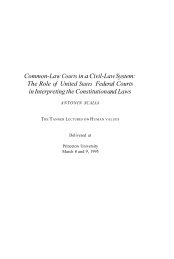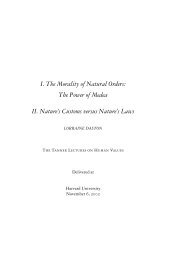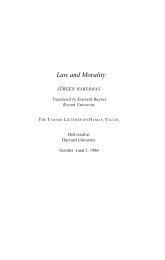Slote, Michael - The Tanner Lectures on Human Values
Slote, Michael - The Tanner Lectures on Human Values
Slote, Michael - The Tanner Lectures on Human Values
Create successful ePaper yourself
Turn your PDF publications into a flip-book with our unique Google optimized e-Paper software.
66 <str<strong>on</strong>g>The</str<strong>on</strong>g> <str<strong>on</strong>g>Tanner</str<strong>on</strong>g> <str<strong>on</strong>g>Lectures</str<strong>on</strong>g> <strong>on</strong> <strong>Human</strong> <strong>Values</strong><br />
But until and unless that happens, we should recognize - something<br />
philosophers have not previously noticed or admitted -<br />
that the comm<strong>on</strong>-sense understanding of our own lives leaves a<br />
definite recognizable place for occasi<strong>on</strong>al, perhaps even frequent,<br />
satisficing moderati<strong>on</strong>. For in fact the phenomen<strong>on</strong> of moderati<strong>on</strong><br />
is not limited to fairy-tale examples, though I believe such examples<br />
allow <strong>on</strong>e to see certain issues large enough and in sufficient<br />
isolati<strong>on</strong> as to make it easier to recognize the phenomen<strong>on</strong> of<br />
moderati<strong>on</strong> in the more muddied waters of everyday life. Even<br />
the example of the pers<strong>on</strong> selling a house and moving to a new<br />
locati<strong>on</strong> need be altered <strong>on</strong>ly in minor ways in order to turn it<br />
from an example of not seeking the best for <strong>on</strong>eself into an example<br />
of actually rejecting the expectable better for the expectable<br />
good enough.<br />
Imagine, for instance, that the pers<strong>on</strong> selling the house has an<br />
agent and that the agent has received a firm bid <strong>on</strong> the house that<br />
falls within the range the seller c<strong>on</strong>siders good enough. <str<strong>on</strong>g>The</str<strong>on</strong>g> agent<br />
tells the prospective buyer that it may take him three or four days<br />
to get in touch with the seller because he believes the latter is<br />
temporarily out of town; the buyer says he is in no hurry; but in<br />
fact the seller has not g<strong>on</strong>e away and the agent c<strong>on</strong>veys the bid to<br />
him <strong>on</strong> the same day it is made. <str<strong>on</strong>g>The</str<strong>on</strong>g> seller then tells the agent to<br />
let the prospective buyer know that his offer is acceptable, but the<br />
agent, who we may assume is no satisficer, tells the seller that he<br />
really ought to wait a few days before accepting the offer that has<br />
been made. After all, he says, the offer is firm, and if we wait a<br />
few days before telling the prospective buyer that you agree to his<br />
terms, a better offer may come in.<br />
Now in the circumstances as I have described them, the seller’s<br />
net expectable utility is greater if he waits -we<br />
are assuming that<br />
the offer already made is firm and that there is no reas<strong>on</strong> to worry<br />
that the pers<strong>on</strong> who has made the offer may get cold feet, since the<br />
latter doesn’t expect his offer to be received for a couple of days.<br />
Yet the seller may tell the real estate agent to c<strong>on</strong>vey his accep-

















